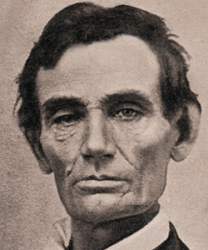Record Data
Source citation
Abraham Lincoln, Speech at a Republican Banquet, Chicago, Illinois, 10 December 1856, in Roy P. Basler, ed., The Collected Works of Abraham Lincoln (8 vols., New Brunswick, NJ: Rutgers University Press, 1953), 2: 383-385, http://quod.lib.umich.edu/l/lincoln/.
Type
Speech
Date Certainty
Exact
Transcriber
Transcription adapted from The Collected Works of Abraham Lincoln (1953), edited by Roy P. Basler
Adapted by Matthew Pinsker, Dickinson College
Transcription date
Transcription
The following text is presented here in excerpted form. Some sections have been removed, as indicated by ellipses, for space. Spelling and typographical errors have been preserved as in the original.
…Our government rests in public opinion. Whoever can change public opinion, can change the government, practically just so much. Public opinion, or [on?] any subject, always has a ``central idea,'' from which all its minor thoughts radiate. That "central idea" in our political public opinion, at the beginning was, and until recently has continued to be, ``the equality of men.'' And although it was always submitted patiently to whatever of inequality there seemed to be as matter of actual necessity, its constant working has been a steady progress towards the practical equality of all men. The late Presidential election was a struggle, by one party, to discard that central idea, and to substitute for it the opposite idea that slavery is right, in the abstract, the workings of which, as a central idea, may be the perpetuity of human slavery, and its extension to all countries and colors. Less than a year ago, the Richmond Enquirer, an avowed advocate of slavery, regardless of color, in order to favor his views, invented the phrase, ``State equality,'' and now the President, in his Message, adopts the Enquirer's catch-phrase, telling us the people ``have asserted the constitutional equality of each and all of the States of the Union as States.'' The President flatters himself that the new central idea is completely inaugurated; and so, indeed, it is, so far as the mere fact of a Presidential election can inaugurate it. To us it is left to know that the majority of the people have not yet declared for it, and to hope that they never will.
All of us who did not vote for Mr. Buchanan, taken together, are a majority of four hundred thousand. But, in the late contest we were divided between Fremont and Fillmore. Can we not come together, for the future. Let every one who really believes, and is resolved, that free society is not, and shall not be, a failure, and who can conscientiously declare that in the past contest he has done only what he thought best---let every such one have charity to believe that every other one can say as much. Thus let bygones be bygones. Let past differences, as nothing be; and with steady eye on the real issue, let us reinaugurate the good old ``central ideas'' of the Republic. We can do it. The human heart is with us---God is with us. We shall again be able not to declare, that ``all States as States, are equal,'' nor yet that ``all citizens as citizens are equal,'' but to renew the broader, better declaration, including both these and much more, that “all men are created equal.”



